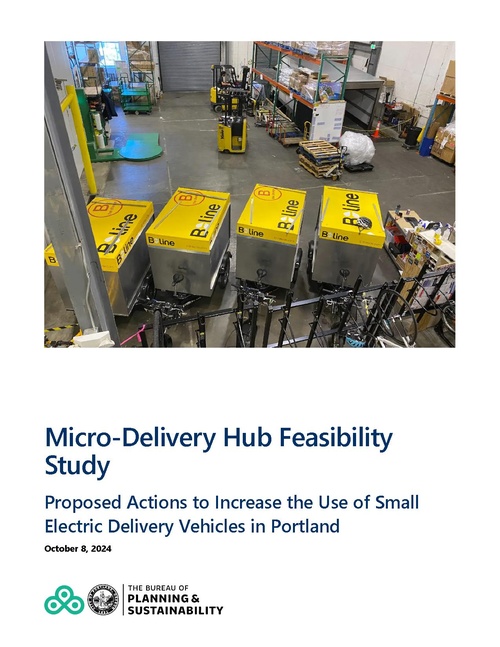Micro-Delivery Hub Feasibility Study
| Paper | |
|---|---|
| Title | Micro-Delivery Hub Feasibility Study |
| Type | report |
| Topic | Mobility Hubs |
| Publisher | The City of Portland |
| Author | Bureau of Planning and Sustainability |
| Issue | 2024-10-29 |
| Date Accessed | 2024-10-29 |
| Pages | 24 |
| URL | https://www.portland.gov/bps/climate-action/documents/bps-micro-delivery-hub-feasibility-report/download |
| File | 
|
This report examines the potential for implementing zero-emissions micro-delivery hubs in Portland to reduce carbon emissions, improve air quality, and enhance safety in urban logistics. Transportation, particularly medium- and heavy-duty vehicles, remains a major contributor to Oregon's greenhouse gas emissions, with significant impacts on low-income and BIPOC communities. Driven by Portland’s Climate Emergency Declaration and the 2040 Freight Plan, this study explores micro-delivery solutions, such as cargo bikes and small electric vehicles, as alternatives to diesel-powered freight trucks. Drawing insights from cities like Boston and New York, the report evaluates Portland’s existing transportation and land-use policies, identifies zoning and regulatory challenges, and proposes pilot projects and code adjustments to support a cleaner, safer, and more sustainable urban delivery network.
Introduction
As of 2021, the transportation sector was responsible for 44 percent of total carbon emissions in Multnomah County. While emissions in most sectors have declined since 2000, emissions in the transportation sector have continued to increase. According to a 2024 statement from the Oregon Department of Environmental Quality, medium- and heavy-duty vehicles are responsible for an estimated 9.3 million metric tons of greenhouse gas emissions in Oregon annually which accounts for approximately 42 percent of all greenhouse gases from the on-road vehicle fleet. This, coupled with the growth of e-commerce, which has resulted in an increased amount of delivery vehicle use, is the motivation behind the Portland Bureau of Planning and Sustainability’s efforts to address carbon emissions from freight. Decarbonizing freight is a priority for the City of Portland. Reducing greenhouse gas emissions from the freight sector has been called for in the Climate Action Plan (2009 & 2015), the Sustainable Freight Strategy (2012), the Climate Emergency Declaration (2020), The Climate Emergency Workplan (2022) and the 2040 Freight Plan (2023). Additionally, research shows that low-income and communities of color face exponentially higher health impacts from diesel pollution. Nearly 40 percent of Black, Indigenous, people of color (BIPOC) Portlanders live close to the city’s biggest sources of air pollution, such as freeways and industrial facilities. This report explores the feasibility of zero-emissions micro-hubs as a key component to a safer, less congested, and cleaner urban logistics and freight network, with the goal of a net-zero carbon emissions transportation system by 2050.
Purpose
The City of Portland’s Climate Emergency Declaration and 2040 Freight Plan emphasize exploring micro-delivery solutions to reduce emissions and congestion and enhance pedestrian safety. Diesel is the most common fuel source used to power heavy duty trucks. Exposure to diesel particulate matter is linked to numerous serious health problems including respiratory issues such as asthma, heart disease, cancer and premature mortality. Not only do heavy trucks pollute the air, they also pose a safety hazard to pedestrians and bikers on narrow urban streets. To ensure a safer, cleaner environment, Portland is exploring options to support micro-delivery vehicles such as cargo bikes and smaller electric vehicles. Small human-powered or electric vehicle (EV) delivery modes promise cleaner, safer deliveries. This shift towards micro-deliveries is currently being tested in other cities. For example, Boston and New York are already piloting micro-delivery programs. By establishing micro-delivery hubs, which are small urban facilities used to transfer, bundle and store goods, Portland can ensure efficient delivery while minimizing emissions and promoting pedestrian safety. By enabling and encouraging micro-mobility solutions, Portland can create a cleaner, safer environment for its residents and pave the way for a more sustainable future. This report describes the existing land use and transportation framework in Portland, as it relates to micro-delivery hubs and micro-delivery devices. It examines current policy and zoning code obstacles and explores how existing micro-delivery companies are adapting to the current environment. The report also discusses efforts in other cities to accommodate micro-delivery and micro-delivery devices. Lastly, the report recommends zoning code changes and pilot project considerations to encourage and enable more micro-delivery hubs to locate in Portland.